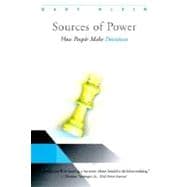
Note: Supplemental materials are not guaranteed with Rental or Used book purchases.
Purchase Benefits
What is included with this book?
| Examples | |
| Figures | |
| Tables | |
| Acknowledgments | |
| Chronicling the Strengths Used in Making Difficult Decisions | |
| Features of Naturalistic Decision-Making Settings | |
| Learning from the Firefighters | |
| Recovering from a Research Plan | |
| Figuring Out How to Do the Project | |
| The Recognition-Primed Decision Model | |
| Listening to the Data | |
| Comparing the Categories | |
| Defining the Recognition-Primed Decision Model | |
| The Theoretical Importance of the RPD Model | |
| Applications | |
| Key Points | |
| The Power of Intuition | |
| The Infected Babies | |
| Some of the Costs of Field Research | |
| Applications | |
| The Power of Mental Simulation | |
| The Polish Economy | |
| Models of Mental Simulation | |
| Explaining a Situation | |
| Projecting into the Future | |
| How Mental Simulations Can Fail | |
| Applications | |
| Key Points | |
| The Vincennes Shootdown | |
| Chronology of the Vincennes Shootdown | |
| Prior Events | |
| Mental Simulation and Decision Making | |
| Mental Simulation and the RPD Model | |
| Situation Awareness | |
| Expectancies | |
| Courses of Action | |
| Testing the RPD Model in Different Domains | |
| Applications | |
| The Power to Spot Leverage Points | |
| Nonlinear Aspects of Problem Solving | |
| Traditional Models of Problem Solving | |
| Stage Models | |
| Artificial Intelligence Approach | |
| The Apollo 13 Mission: A Case Study of Problem Solving | |
| Problem Solving and Decision Making | |
| Applications | |
| Key Points | |
| The Power to See the Invisible | |
| Patterns | |
| Anomalies | |
| The Big Picture: Situation Awareness | |
| The Way Things Work | |
| Opportunities and Improvisations | |
| The Past and the Future | |
| Fine Discriminations | |
| Managing Our Own Limitations | |
| Expertise and Decision Making | |
| Applications | |
| Key Points | |
| The Power of Stories | |
| Features of Good Stories | |
| Using Stories to Make Sense of Events | |
| Applications | |
| Key Points | |
| The Power of Metaphors and Analogues | |
| The Logic of Metaphorical Reasoning | |
| The Logic of Analogical Reasoning | |
| Generating Expectancies | |
| Solving Problems | |
| Applications | |
| Key Points | |
| The Power to Read Minds | |
| Intent | |
| Considerations in Communicating Intent | |
| Applications | |
| Key Points | |
| The Power of the Team Mind | |
| The Concept of Team Mind | |
| The Functions of a Team Mind | |
| How a Team Mind Develops | |
| The Development of Team Decision Making | |
| Team Competencies | |
| Team Identity | |
| Team Cognition | |
| Team Metacognition | |
| The Chaotic Nature of the Team Mind | |
| Unpredictable Ideas | |
| Unpredictable Flow of Attention | |
| The Delusion of Controlling Their Own Thoughts | |
| Interruptions | |
| The Delusion of Controlling Their Actions | |
| Ideas That Control the Team | |
| The Team Mind as a Metaphor for Thinking | |
| Applications | |
| Key Points | |
| The Power of Rational Analysis and the Problem of Hyperrationality | |
| The Role of Rational Analysis | |
| The Nature of Rational Thinking | |
| The Limits of Rational Thinking | |
| Lack of Basic Elements | |
| Ambiguous Rules | |
| Difficulty of Setting Up the Calculations | |
| Combinatorial Explosions | |
| The Hobgoblin | |
| Key Points | |
| Why Good People Make Poor Decisions | |
| Are Poor Decisions Caused by Biased Thinking? | |
| What Accounts for Errors in Natural Decision Settings? | |
| The Effect of Stress on Decision Making | |
| The Problem of Uncertainty | |
| Expertise versus Superstition | |
| Applications | |
| Key Points | |
| Conclusions | |
| Compiling the Assertions | |
| Connecting the Sources of Power | |
| Is This Science? | |
| Final Thoughts and Final Perceptions | |
| Notes | |
| References | |
| Index | |
| Table of Contents provided by Publisher. All Rights Reserved. |
The New copy of this book will include any supplemental materials advertised. Please check the title of the book to determine if it should include any access cards, study guides, lab manuals, CDs, etc.
The Used, Rental and eBook copies of this book are not guaranteed to include any supplemental materials. Typically, only the book itself is included. This is true even if the title states it includes any access cards, study guides, lab manuals, CDs, etc.